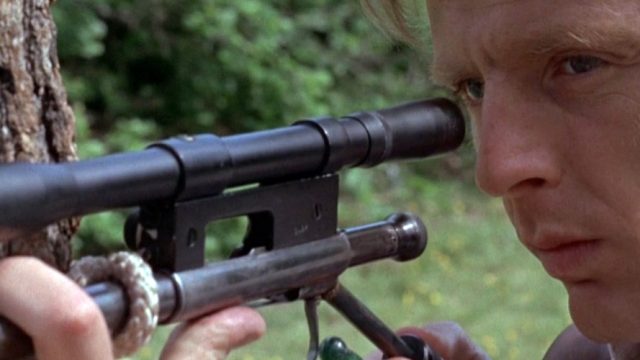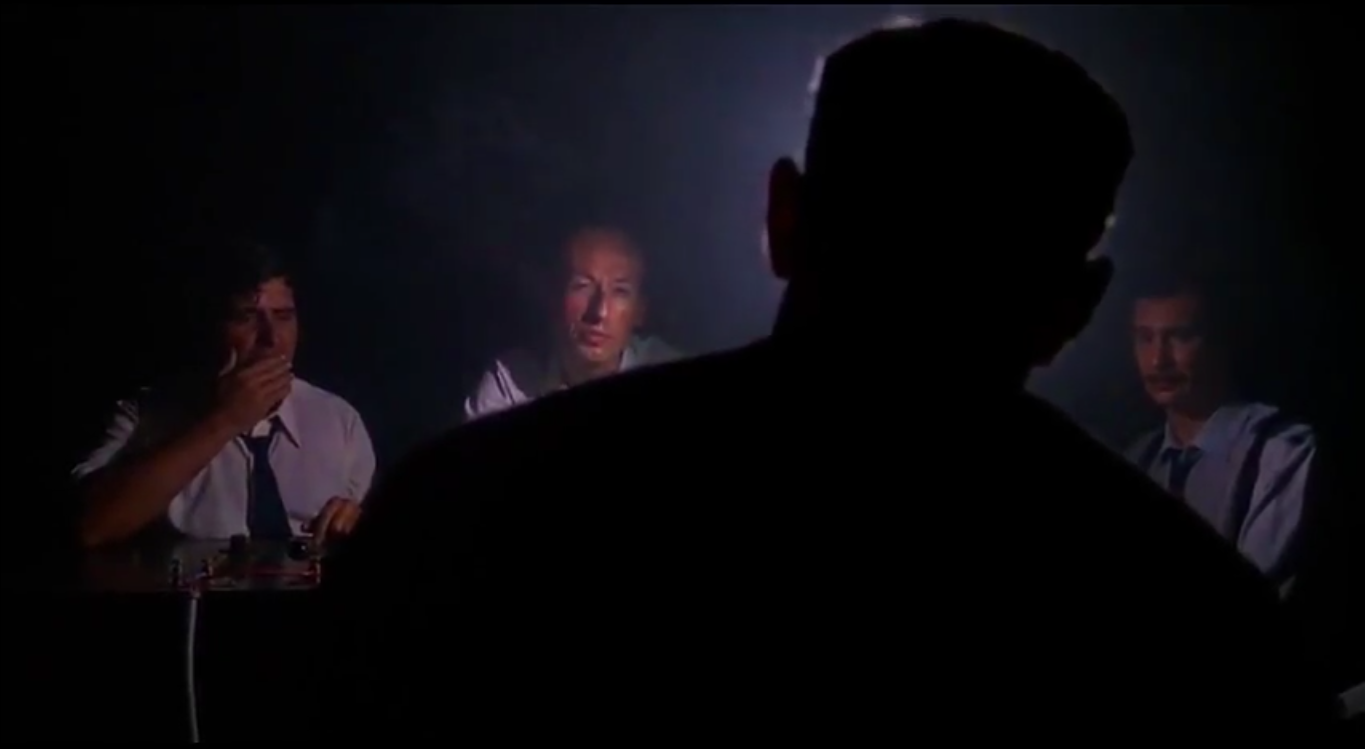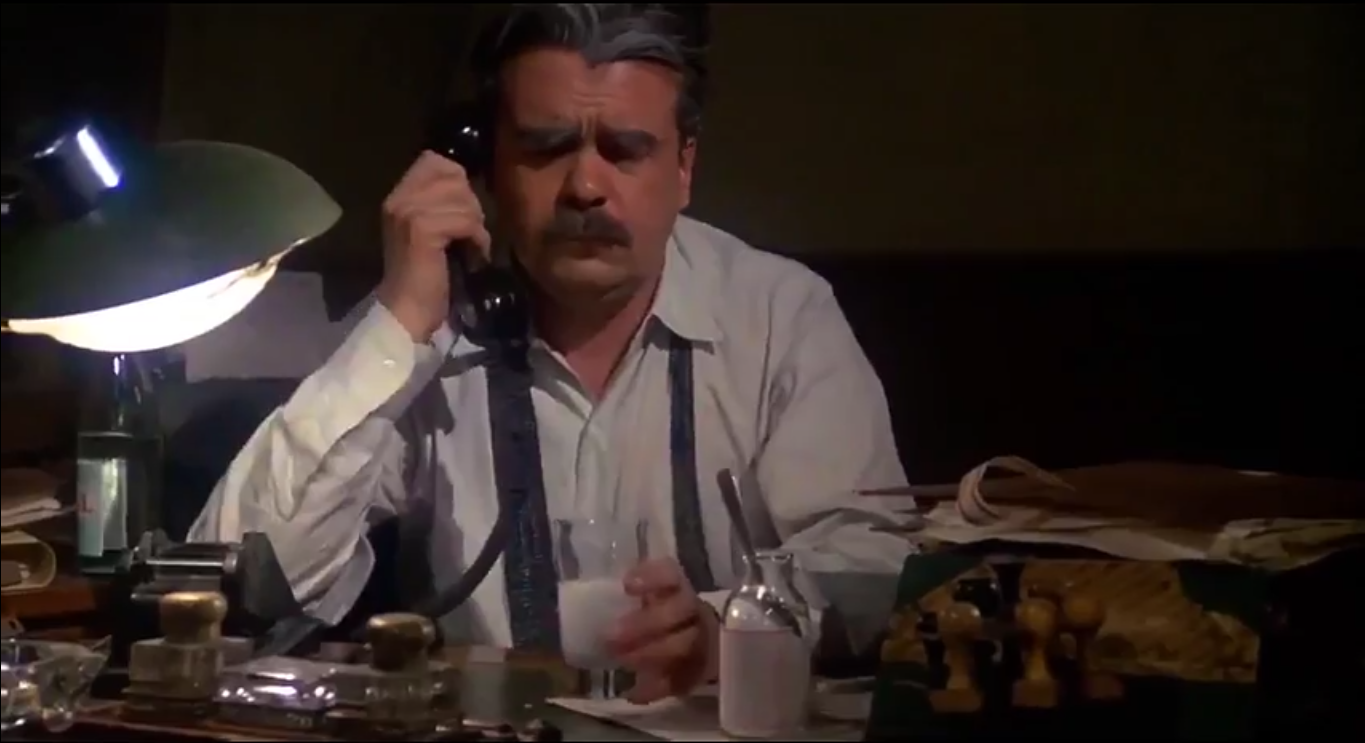“Watching Suspiria I had this thought: why aren’t more horror movies like Suspiria?” (Noel Murray)
One could also ask, why aren’t more action/suspense films like The Day of the Jackal? The answer lies in a remark from our own ZoëZ: unique among film genres, action movies depend on technique. Drama can be executed clumsily and still move us, probably because so many of our own most dramatic experiences don’t involve lines delivered in iambic pentameter and well-timed exits; comedy can be rough and loose-formed and still be funny: witness the careers of Adam Sandler and Judd Apatow. Action movies, though, portray the accomplishment (or not) of specific tasks, and from the level of the plot to the scene, everything has to go off according to plan, not necessarily the protagonists’ plan: stunts have to look right, ‘splosions have to fire on time, directors have to know how long to hold and when to cut. In a genre that rewards professionalism, there are a lot of movies about professionals, and Fred Zinnemann’s The Day of the Jackal exemplifies a near-perfect professionalism on both sides of the camera.
Frederick Forsyth began his novel (and the film follows it almost exactly) with a couple of historical facts: in 1962, the right-wing OAS (largely veterans of France’s unsuccessful campaign to hold on to Algeria) attempted and failed to assassinate President Charles de Gaulle. Not long after that, there were a series of bank robberies across France. So, Forsyth thought, what if the OAS was financing another assassination attempt? (A neat intertextual detail: Jean Martin, who played the lead paratrooper in The Battle of Algiers, appears as the OAS generals’ bodyguard, and I choose to see him as the same character, probably disgraced out of the service and serving the generals out of loyalty, and because he wouldn’t work for anyone else. When the French Secret Service captures and tortures him, the line “you know yourself, they always talk in the end. You’ve seen it with your own two eyes in–where was it, Indochina? And Algeria, of course” gets an extra resonance.) That’s the premise of The Day of the Jackal, book and movie, and right away there’s a challenge: since de Gaulle was never assassinated, we know the ending. The story has to be entirely about the how and the why, because history has locked down the what.
Realizing that the organization has been too much infiltrated by informers, the generals hire a professional assassin (Edward Fox), who names himself the Jackal. Right away, we get a key beat of character and therefore plot: the Jackal realizes that he can never work again after this, so the fee has to be huge (half a million dollars; wow, 1963 was a long time ago) and the plot has to be perfect. He takes the job and goes to work, and now The Day of the Jackal starts to distinguish itself. A simple rule that filmmakers too often forget or ignore: if you’re going to show someone doing something, you better know how to do it. The Day of the Jackal is damned near an instructional video on how to assassinate a head of state, and a lot of the tasks are as mundane as they should be: the Jackal’s first stop is the British Museum, where he starts researching de Gaulle. We see almost all the steps, filmed in an uninflected style: obtaining false passports and identity cards, obtaining and testing a rifle, finding the place to shoot from, negotiating with gunmakers and forgers, smuggling hair dye across the border, hooking up with men and women. Almost all the steps: the film actually improves on the novel as a work of suspense, because Zinnemann and screenwriter Kenneth Ross carefully withhold a few details from us. We don’t know exactly how he intends to bring this off, so when Zinnemann reveals the last step in the plan, it has the impact of a twist ending: it was there all along and we never saw it.
The Jackal is a professional, and so is Fox. In terms of “invent nothing, deny nothing” as a criterion for a great performance, Fox understands that there’s nothing to invent here. He fits well into cinema’s Guild of Professional Killers, with the same spooky calm as Alain Delon in Le Samouraï (and a wardrobe that’s just as English as Delon’s was French) and the compact, machined look of Tom Cruise in Collateral. Fox has an undercurrent of quiet amusement that’s different from Delon’s (again, quite French) existential despair and Cruise’s (quite Cruise-like) strain of mania; he knows that his perfectionism is necessary and a little bit ridiculous. When he tells the gunmaker (Cyril Cusack) that he must hand over all his notes, there’s the subtext of “this is the part of the job where I threaten you, no worries, K?” and Cusack plays it back brilliantly, just as amused and just as subtly. And when someone else doesn’t hand over the notes, Fox lets loose the scariest laughter that side of Assistant Manager Tom Myers, just before he flips the switch and goes into killing-machine mode.
The professional protagonist has an equally professional antagonist, not introduced until almost halfway through the film: Deputy Commissioner Claude Lebel (Michel Lonsdale), assigned to find and capture the Jackal, and to do it entirely in secret. Almost mumbling, shuffling, and looking like he’s just come out of a clothes dryer, Lonsdale’s Lebel doesn’t initially come off as kind of threat, but his second scene (right after he’s been assigned the case) completely flips that. He, along with his deputy Caron (played by a young and on-point Derek Jacobi), realizes right away that they’ve been set not to catch the Jackal but the blame for failing to catch him, and Lebel swings into action:
–We start by recognizing that after de Gaulle, we are the two most powerful people in France. Now make notes. Get my secretary transferred until further notice, you will be my secretary and assistant rolled into one. I want a camp bed in here with linen and all the usual, including something to wash in and shaving things. Also, get a percolator and lots of coffee. Get on the switchboard. I want a good telephonist, the best they’ve got, and I need ten outside lines working round the clock. If there’s any nonsense, refer them to Berthier. This job gets top priority at all times.
–Do you want anything from them immediately?
–A person-to-person link to the heads of the homicide divisions of the following countries, uh–Holland, Belgium, Italy, West Germany, South Africa, the FBI in the United States, and Scotland Yard, Special Branch, in Britain. How many is that?
–Seven.
–Get the head man at home or in the office, ask them to take a call from me tomorrow morning, and see that there’s no one listening in.
Although his attitude and appearance are directly opposite to Al Pacino’s swagger in Heat, he’s doing the same thing and just as memorably, firing off all the necessary orders to subordinates, and it has the same effect on the story: this is not someone who panics or gets overwhelmed, this is a man sure of his ability to command an organization and a procedure (Lebel’s first concern is that he and Caron can work in the office 24/7), and you fuck with him at your peril. This scene creates, using nothing but language and the screen presence of Lonsdale and Jacobi, that action-movie thrill of the battle has begun.
Having seen so far how the Jackal operates, we can now see the growing network of people Lebel can enlist on his side, the steps they take to find the Jackal, and how they’re just as mundane: going through thousands of birth and death certificates, hundreds of hotel records, meetings with officials, phone call after phone call after phone call, setting up wiretaps on the French cabinet to smoke out a mole. All through it, Lebel never raises his voice or hurries, just leads the grinding and methodical work of the hunt, the perfect bureaucrat just as the Jackal is the perfect killer, part of the genealogy that gave us both Ward Littell and Dutch Wagenbach, the guy who beats you because you always underestimate him. (“How did you know whose telephone to tap?” “I didn’t, so I tapped all of them.”) What makes this battle so compelling is that it’s structural rather than moral, not good vs. evil but the organization vs. the loner: the French torture prisoners, the Jackal kills anyone in his way, but unlike, say, Mission: Impossible–Fallout, there are no speeches from either side proclaiming the necessity of doing these things. The Day of the Jackal is about the doing and leaves the judgment to us, where it belongs.
There are other players in the story, and just as professional; most interesting are the young war widow (Olga Georges-Picot) who seduces one of the French ministers to act as an informant for the OAS, and the aristocrat’s wife (Delphine Seyrig) who goes to bed with the Jackal late in the story, which ends about how you would expect. (Seyrig and Fox do get some deeply weird dialogue first, though, very much like Sinatra and Leigh in The Manchurian Candidate: “I’m enthralled by combine harvesters. In fact, I yearn to have one as a pet.”) Georges-Picot plays with a deep sadness (and Barrie Ingham as the minister plays with enough upper-class stupidity that it’s believable he doesn’t pick up on it), Seyrig plays with a kind of entitled boredom that makes her feel like a descendant of Glenn Close in Dangerous Liaisons, but neither shows any sentimentality or shame, one more element of The Day of the Jackal’s mature amorality.
Although a discussion of professionalism in cinema calls up Michael Mann, The Day of the Jackal isn’t really like his movies. Mann’s professionals, and Mann’s professionalism, are always in conflict with their romanticism, something that always comes out in the beauty of the images as well as the story. That’s part of what makes his films unmistakably personal and unique. Here, there’s nothing to conflict with the professionalism, no distractions (when the Jackal seduces
Seyrig’s character, he’s not doing it for anything except cover), and no superfluous style. Part of the grim comedy of The Day of the Jackal is that the most unprofessional character is Charles de Gaulle himself, refusing to take the advice of his security chief and making himself vulnerable. Like A Night to Remember, this is an anonymous work in the best sense: the Jackal’s task is to kill de Gaulle, Lebel’s task is to prevent it, and Zinnemann’s team’s task is to show us both. With a lifetime’s training and discipline, anyone can do it; that’s the creed of the professional.
None of this means that The Day of the Jackal has no style, simply that the style is always subordinate to the task of showing how people do things. In particular, Zinnemann efficiently uses the backgrounds of shots to convey who people are and what they’ve done: the investigation scenes are loaded with many people going through files, conversing, writing; Lebel’s office grows more cluttered throughout the film; and when the Jackal crosses the border into France, the collection of blond men of medium height tells us (and him) everything we need to know about the French investigation.
The assassination attempt itself is bold, thrilling, no-frills filmmaking, done with only a voiceover (about the heightened security measures) at the beginning and no words at all after that. Lebel wanders throughout the frame, watching, looking; he has a great moment where the police grab someone, not the Jackal. Since we know it’s not the right guy, there’s no point in giving this beat any suspense, and Lonsdale’s expression is devoid of hope throughout; he of all people knows it won’t be this easy. The final moments unbearably ramp up the tension without any kind of aggressive crosscutting or sound/musical/special effects; there’s a brilliantly perverse moment that stalls the action for just one moment (The Manchurian Candidate does this too), and then there’s just the longshot of Lebel realizing what’s going on, us seeing what he sees, and the race to get half a second in front of the Jackal’s plot. (There aren’t many films that depend on the audience’s intelligence to drive the suspense the way this one does.) The ending happens so quickly it seems to be over before we know it’s happened, as violence often is.
Going back to the question at the beginning, The Day of the Jackal has had few imitators in the last 45 years, because few filmmakers have cranked themselves up to the level of smarts necessarily to pull this off, or want to. The following year, The Taking of Pelham One Two Three gave us the same kind of intelligence and evenly matched opponents and substituted great local texture for an obsession with procedure. (In comparison, The Day of the Jackal feels almost abstracted in its approach to location.) Since then, Mann was probably the closest we’ll get. 24 had many moments that approached this level of craftsmanship, but like so many other things in that show, it was overwhelmed by the need to give the audience something shocking roughly every commercial break. (A season of 24 that focused, like this movie, on a single plot and a single attempt to stop it, would be a legend.) The real failure, though, is the 1997 remake The Jackal, which is The Day of the Jackal by, for, and about stupid, stupid people. (Forsyth got his name taken off the movie, Zinnemann got the title changed, Fox turned down a cameo role. Only Kenneth Ross remains in the credits, but I can’t determine if he was alive at the time, or if in fact he ever existed.) Every single aspect of the original got destroyed in the service of spectacle or production: the elegant assassin’s rifle becomes a 1400-rounds-per-minute machine gun that makes things go kaboom; the two handcrafted disguises become something like half-a-dozen that would be the envy of Matthew Rhys on The Americans and still make Bruce Willis look like Bruce Willis, every time; the sensible political targeting of the OAS becomes a showy revenge killing (with perhaps the least effective fakeout I’ve ever seen); the simplicity of the hunter-and-hunted structure gets buried under superfluous subplots, characters, and performances; and Sidney Poitier, Diane Venora, and even J. K. Simmons get totally wasted in all the clutter. I know they don’t make them like The Day of the Jackal anymore, but I didn’t need it to be proved so painfully.



